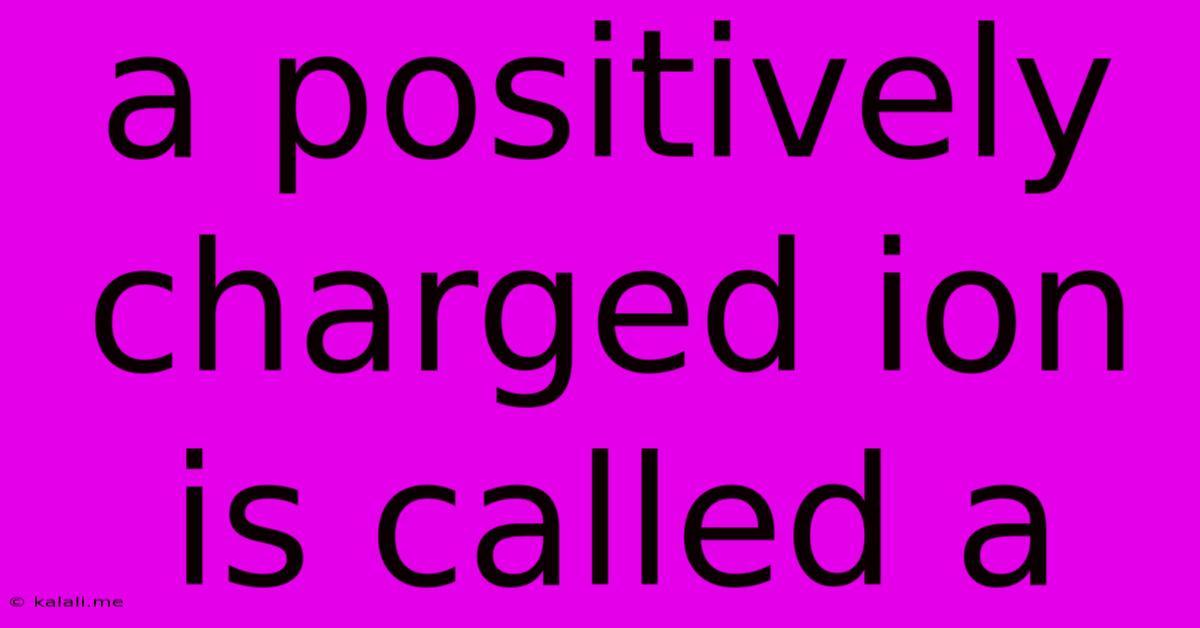A Positively Charged Ion Is Called A
Kalali
Jun 12, 2025 · 3 min read

Table of Contents
A Positively Charged Ion is Called a Cation: Understanding Ions and Their Charges
A positively charged ion is called a cation. This fundamental concept in chemistry is crucial for understanding various chemical reactions and processes. This article will delve into what cations are, how they're formed, and their importance in different fields.
Understanding the term "cation" requires grasping the broader concept of ions. Ions are atoms or molecules that have gained or lost one or more electrons, resulting in a net electrical charge. This charge imbalance is what distinguishes ions from neutral atoms or molecules. When an atom loses electrons, it becomes positively charged because it now has more protons (positively charged particles) than electrons (negatively charged particles). This positively charged ion is precisely what we define as a cation.
How Cations are Formed
Cations are typically formed when atoms with relatively low ionization energies lose electrons. Ionization energy refers to the energy required to remove an electron from an atom. Atoms with low ionization energies readily lose electrons, often to achieve a more stable electron configuration, usually a full outer electron shell (octet rule). This process is often observed in metals, which tend to lose electrons to form positive ions.
For example, a sodium atom (Na) has one electron in its outermost shell. It readily loses this electron to become a sodium cation (Na⁺), achieving a stable electron configuration similar to neon. This process is often represented in chemical equations as:
Na → Na⁺ + e⁻
Where 'e⁻' represents the lost electron.
Examples of Common Cations
Many common elements form cations. Some examples include:
- Sodium cation (Na⁺): Found in table salt (NaCl) and plays a crucial role in many biological processes.
- Calcium cation (Ca²⁺): Essential for strong bones and teeth, and involved in muscle contraction.
- Potassium cation (K⁺): Important for nerve impulse transmission and maintaining fluid balance.
- Magnesium cation (Mg²⁺): Plays a vital role in numerous enzyme reactions and muscle function.
- Iron cation (Fe²⁺ and Fe³⁺): Found in hemoglobin, the protein responsible for oxygen transport in blood. Note that iron can form cations with different charges.
The Importance of Cations
Cations are vital in numerous areas, including:
- Biology: Essential for various biological processes, including nerve impulse transmission, muscle contraction, and enzyme activity. Electrolyte balance, which involves cations like sodium, potassium, and calcium, is crucial for maintaining proper bodily functions.
- Chemistry: Cations participate in countless chemical reactions, forming ionic compounds with anions (negatively charged ions). These compounds have diverse applications in various industries.
- Materials Science: The properties of many materials are directly influenced by the presence and arrangement of cations within their crystal structures. This affects their strength, conductivity, and other crucial characteristics.
Distinguishing Cations from Anions
It's important to differentiate cations from anions, which are negatively charged ions. Anions are formed when atoms gain electrons, typically non-metals that readily accept electrons to achieve a stable electron configuration. Examples include chloride ions (Cl⁻) and oxide ions (O²⁻). The opposite charges of cations and anions are what drives the formation of ionic compounds, where the electrostatic attraction between positive and negative charges holds the ions together.
In conclusion, a positively charged ion is definitively called a cation. Understanding the formation and properties of cations is essential for grasping fundamental concepts in chemistry, biology, and materials science. Their importance in various biological processes and chemical reactions highlights their crucial role in the world around us.
Latest Posts
Latest Posts
-
Single Entry Vs Double Entry System
Jun 13, 2025
-
Which Of The Following Is A Rational Number
Jun 13, 2025
-
Which Of The Following Components Converts Ac To Dc
Jun 13, 2025
-
The Middle Letter Of The Alphabet
Jun 13, 2025
-
The Expanded Ends Of A Long Bone Are Called The
Jun 13, 2025
Related Post
Thank you for visiting our website which covers about A Positively Charged Ion Is Called A . We hope the information provided has been useful to you. Feel free to contact us if you have any questions or need further assistance. See you next time and don't miss to bookmark.